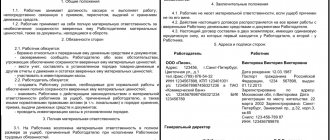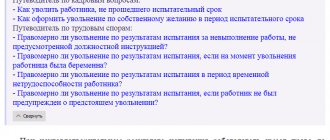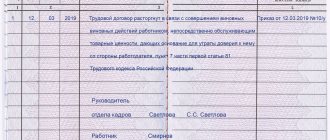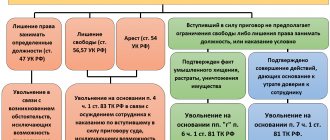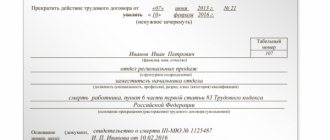Author of the article: Roman Gavrilov Last modified: January 2021 29670
When concluding an employment contract, trust between the employee and the employer is assumed and is rarely specified in a separate clause. Legal relations of an official nature are subordinate and assume that the employee follows legal orders, the order of the head of the enterprise or department. The legality of the actions of the parties to labor relations is justified by the Labor Code of the Russian Federation, special regulations of a general and local nature. Dismissal under the article “loss of trust” is permitted in exceptional cases.
What is loss of trust
What is meant by loss of trust?
What a loss of trust is is not set out in labor legislation, but there is an explanation of what an employer should do if an employee has violated contractual obligations in relation to financial and material assets.
Job loss is associated with the following illegal actions:
- causing damage;
- committing theft;
- destruction of property;
- failure to comply with regulations regarding material assets;
- failure to comply with the rules for conducting cash transactions;
- sale of goods at inflated or reduced prices;
- illegal drawing up of property write-off acts;
- fraud in relation to the employer's property.
If the employer notices that his employee has committed illegal actions, then the former has the right to dismiss the latter under the article.
The labor legislation does not have a specific article on the dismissal of employees due to loss of trust. The employer also has the right, based on its own decision, taking into account a number of factors, to conduct investigations to identify arguments.
The reasons for the loss of trust may be actions related to the circulation of material assets, including their theft, unreasonable waste, but again this must be thoroughly proven before taking action, otherwise everything may turn against the employer.
Recording in labor
A mandatory entry must be made in the work book that confirms the reason for dismissal. For this:
- In the column with information about dismissal, they write something like this: “dismissed for committing guilty actions, after which the trust of the employer was lost.” At the end, they refer to the relevant legal norm (Article 81 of the Labor Code). The wording must be similar to that contained in the order.
- In the column with the grounds indicate the date and number of the issued order, thanks to which the termination of the contract was formalized.
Who gets fired due to loss of trust
The employer has the right to dismiss due to loss of confidence of employees of the following categories:
- Warehouse Manager;
- merchandiser;
- cash register worker;
- serviceman;
- civil servant.
If the employee is in the public service, then dismissal is made on the basis of a memorandum from the personnel service or on the basis of a prepared act.
Mikhail Ignatiev
The document signed by the president does not specify what specific actions of Ignatiev caused the loss of trust. However, most have no doubt that the scandal that broke out a few days ago is to blame. On January 18, in Cheboksary, Ignatiev handed over the keys to a new fire truck to employees of the local Ministry of Emergency Situations. Unexpectedly, the head of the republic decided to “play dog”: he raised his hand with the keys above his head so that Emergencies Ministry Major Evgeny Vasiliev was forced to jump up in order to reach and take them.
The media and Internet users, who had video footage from the ceremony, began to actively criticize Ignatiev and called his act unethical. Let us note that just 5 days before the incident with the keys, the head of Chuvashia allowed himself a harsh statement regarding bloggers and journalists: he called on them to simply “kill them.” So the press representatives did not even think of sparing the leader of the republic in the current situation.
After the event received wide resonance, the governor’s behavior was reviewed by the Ethics Commission of the United Russia party. Secretary of the party’s General Council Andrei Turchak said that Ignatiev’s actions are “beyond understanding.” After being expelled from the ranks of United Russia, Ignatiev’s presence in such a responsible position no longer suited the highest executive authorities.
Articles on the topic (click to view)
- What to do and where to go if you are not paid upon dismissal
- What to do if you are laid off at work
- What to do if the employer does not want to fire at his own request
- What to do if the date of the dismissal order is later than the date of dismissal
- What to do if the employer does not give the work book after dismissal
- What to do if you didn’t work officially, you were fired, you didn’t get paid
- What is the employer obliged to give the employee on the day of dismissal?
Grounds for dismissal
Grounds for dismissal due to loss of confidence
Loss of Confidentiality - This ground applies to government employees. Only a representative of a government agency can terminate a contract with the explanatory wording “loss of trust” due to:
- violation of restrictions;
- failure to comply with requirements;
- ignoring the fulfillment of duties.
Firing a CEO is different from firing a low-level employee. This is usually due to the specifics of work activity, that is, the implementation of the responsibilities and rights of the owner. The General Director may be dismissed based on a decision of one of the members of the special meeting based on a disciplinary violation.
The dismissal of the chief accountant is possible due to a violation of his financial activities, since he is in charge of all material assets.
The dismissal of a civil servant occurs for the following reasons:
- When a conflict of interest arose, appropriate measures were not taken in a timely manner.
- All information about taxes, as well as information about these circumstances, is not provided.
- Illegal participation in a commercial project with the receipt of funds.
- Illegal business activities were carried out.
- Relations with employees of foreign organizations.
- Have an account abroad.
- Personal interest in conflict situations.
If an employee violates the law, he automatically falls under the article on loss of trust. The employer’s actions in relation to this employee are not just termination of contractual obligations, but an investigation followed by recourse to the courts.
Grounds under the article of the Labor Code of the Russian Federation
The Labor Code does not contain a list of actions that an employer can or should regard as grounds for showing distrust of an employee. However, based on the interpretation of clause 7, part 1, art. 81 of the Labor Code of the Russian Federation, termination of legal relations under this provision is possible in the following cases:
- a subordinate has committed a culpable offense;
- he is responsible for commodity, material assets;
- the actions of the subordinate served as the basis for a loss of trust on the part of the company's management.
Dismiss the employee on the basis of clause 7, part 1, art. 81 of the Labor Code of the Russian Federation is possible provided that the actions that served as the basis for mistrust were committed not at the workplace or in connection with the performance of a work function (paragraph 2, paragraph 45 of the resolution of the Plenum of the Supreme Court of the Russian Federation of March 17, 2004 No. 2).
Dismissal process
Algorithm for the dismissal procedure
In order for an employer to fire an employee who has lost confidence, you can use the following algorithm of actions:
- Drawing up a report by the employee who noticed the violation. State the reasons for dismissal clearly and concisely.
- Formation of a commission based on the observed violation.
- Work of the commission. Members of the commission must establish the facts of what happened, thoroughly review the evidence, recalculate the availability of material assets and determine what is missing. Evidence of guilt must be found and presented to the accused.
- Preparation of a report based on the results of the work of the commission members. Record the document in the prescribed form.
- Familiarize the employee who committed the violation with the Act.
- Terminate the employment agreement unilaterally.
- Preparation of an administrative document for dismissal from the enterprise. Moreover, there is no need to demand any explanation from the employee.
Procedure
The procedure for dismissal due to loss of confidence is standard. It is worth considering that the first important point will be the existence of grounds and the collection of evidence, based on which the head or a special commission is already deciding what type of punishment will be applied to the violator.
Proof of guilt in a step-by-step version:
a commission consisting of at least three persons is created by a special order indicating the reason and duration of work;
Sample order to create a commission to conduct an internal investigation
- all persons who are members of the commission must be strictly neutral, since even the presence of personal relationships can lead to further appeal of the decision;
- all circumstances are identified, as well as facts regarding the violation, including damage, place and time;
- calculation of damage or shortfall on all financial documents;
- finding the culprit;
- collection of evidence;
- guilt and its degree are determined;
- the amount of recovery is calculated;
- After identifying the cause of the violation, a verdict is issued.
During an inspection, an employee may be required to provide an explanation, but this form is not mandatory.
Important! A commission can be created even in cases of actions that could lead to damage to the organization. The fact of damage itself is not mandatory. After the meeting, the commission must sign the order, and also attach to it the completed inspection reports and all procedures
After the meeting, the commission must sign the order, as well as attach to it the completed inspection reports and all procedures.
If the penalty involves dismissal, then the employer must receive a written explanation from the employee and present the order against signature. If you refuse to sign, the employer reads the order in front of witnesses.
The order itself for loss of confidence is created within the first two weeks after the offense.
sample letter of dismissal for loss of confidence
dismissal order for loss of confidence
Notice of dismissal is sent to the employee. The rest of the procedure corresponds to the standard process, that is, a calculation is made and a mark is placed on the labor report indicating the reason for dismissal. This approach is used only for serious violations. More often, the wording is affixed at one’s own request, but this is possible without causing serious harm to the organization. It is also worth considering that if trust is lost, work may not be carried out.
Sample entry in the work book about dismissal due to loss of trust
Dismissal with loss of confidence is regulated by Art. 81. The main feature is the presence of a valid reason for dismissal under this article, as well as the presence of an evidence base. For an employee, dismissal on such grounds can lead to negative consequences; for this reason, the manager must strictly take into account all the norms of legislation and labor law.
Drafting a memorandum
Today there are no specially provided forms for drawing up documents, so everything is recorded in the report of the employee who noticed the misconduct of his colleague.
The report should also contain information:
- The full surname and initials of the employee on whose part the illegal actions were committed.
- Date and preferably time when the violation was noticed.
- During what work was the damage observed (for example, during an inventory).
- List of documents confirming the fact of violation.
Based on the above, an administrative document is prepared.
Employer actions and responsibilities
An employee dismissed due to loss of management's trust has the right to receive payments provided for in the employment contract. Of these, the amount of damage must be withheld, which does not exceed the average monthly earnings (if no more than one month has passed from the date of determining the amount).
An employee dismissed on the above grounds, who has not entered into an agreement with the employer on full or partial financial liability, has the right to file a complaint about the violation with the labor inspectorate and a court of general jurisdiction. When establishing a violation of the rights of an employee, the court may decide to reinstate him in his previous position.
In this case, the employer is liable under Articles 237 and 394 of the Labor Code. He is obliged:
- compensate for unpaid wages during forced absence from work;
- compensate for moral damage.
The decision of the labor inspectorate against an employer who is a legal entity may be a fine of 30-50 thousand rubles, and against a manager or individual entrepreneur - 1-5 thousand rubles.
Making an order
Order of dismissal
After the fact of violation was noted, the organization had to prepare a draft administrative document.
It should reflect the following information:
- The preamble describes the offense that was committed and states the facts.
- The order part of the document clearly and concisely states what the employee violated and when it was noted. The composition of the commission to conduct an investigation into the incident is determined. The working hours of the commission and the time for preparing the act are determined.
- After preparation, the draft order undergoes legal examination and after receiving a positive conclusion, it is agreed upon with interested parties and signed by the head.
The employee who committed the violation must be familiarized with the Order. The commission can work independently and the decision made based on the work can be the final verdict. If controversial issues arise, you should contact the court.
What payments are due?
Distrust of the bosses and their keen desire not only to quickly get rid of the employee, but also to complicate his financial situation is a direct path to defeat in a labor dispute. Regardless of the grounds for dismissal, the calculated amounts are largely unshakable:
- salary for the time he managed to work before the date of departure;
- compensation payments for all types of paid leave that the employee did not have time to take;
- compensation for overspending of personal funds on accountable expenses in favor of the enterprise;
- all additional payments approved in the collective agreement that are not directly dependent on the reason for dismissal.
It is also necessary to exercise caution in the issue of calculating wages during the period of the internal investigation. An employee who has lost confidence cannot be removed from work on the basis of Art. 76 of the Labor Code, even if the employer is reasonably concerned about the safety of his material assets. This problem can be solved tactically by offering a temporary transfer to another position, while maintaining the employee’s previous salary.
There is a separate nuance regarding the deduction of the cost of damage caused. If an agreement on financial liability was not concluded with the dismissed person, and he does not agree to compensate for the damage, then it is impossible to withhold even a penny from the settlement amounts. This dispute will have to be resolved in court.
List of documents for dismissal
To ensure the implementation of the procedure, it is worth knowing what documents should be in the package and how to behave with an employee who has violated the norms.
In order not to violate the rights of a subordinate, you must:
- Notify the employee about the discovery of the pass, and do this in writing.
- Issue an administrative document regarding what has been identified.
- Make a full settlement with the employee.
- Issue documents: pay book and salary certificate for the last year of work.
If the employer discovers that the employee has committed misconduct, the former has the right to terminate the employment agreement at any time. Issuing a warning about a violation is not standardized according to time indicators.
If the employee receives the notification, then he familiarizes himself with it and signs it, and if he refuses to sign it, then the employer draws up a free-form act.
The procedure for requesting explanations from the perpetrator
If the employee himself is ready to give written explanations on the current situation, he does not need to be given a written request to give them. It is enough to receive his voluntary explanations in paper form.
If a conflict arises and the employee clearly does not want to give explanations, he should be given a notification of their provision against signature. After this he has 2 working days to respond. If explanations are not received within the specified period, an act of refusal to provide explanations is drawn up.
SAMPLE NOTICE OF CLARIFICATIONS
SAMPLE ACT OF REFUSAL TO GIVE EXPLANATIONS
Procedure for dismissal from public service
A valid reason is a medical prescription. That is, the employer can transfer the employee to another position or terminate the contract altogether. To do this, the employee must provide a medical report. It is this document that is attached to the order and to the employee’s personal file.
- certificate from a medical institution;
- certificate of purchase of real estate in another area;
- a certificate from the spouse’s work confirming the need to move;
- death or illness certificate;
- other documents confirming positive reasons.

